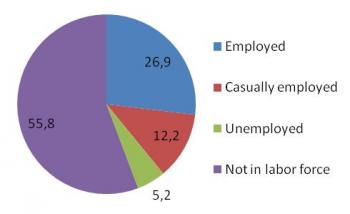What is the background of the EFE concept?
The vicious cycle of discrimination – statistic findings
The majority of the Czech Roma (64 %) were the most likely (among other EU Member states) to confirm that had been discriminated on the basis of ethnicity at least once in the past 12 month (based on the EU-MIDIS Discrimination survey, 2009, 505 respondents). This high number should be explained by three specific features of Roma situation in Czech republic. First, the Roma population in the Czech Republic is not so much spatially segregated. The most of Roma live in urban settings and are in everyday contact with mainstream society. Second, there is also relatively high awareness of antidiscrimination laws among the Czech Roma; 57 % of them confirm that laws are in place to prevent workplace discrimination (although hardly nobody use this protection in case they face obvious discrimination). Third, according to the findings of the longitude survey about attitudes of the majority to the Roma, the negative approach persists in Czech society in 67% of population in 2010.
Nevertheless, the alarming numbers correspond to the experience of IQRS’s workers and their Roma clients and remain a challenge.
The findings listed in the chart illustrate the consequences in the labour market: a high number of demotivated unemployed Roma, which results in resignation on the labour market participation, and unequal treatment from employers.
Roma experience of discrimination in Czech republic| Mean discrimination rate (% discriminated against in the past 12 month) | 64 |
| Roma opinion: Is discrimination on the basis of ethnic or immigrant origin widespread? (yes, %) | 83 |
| Labour market: % discriminated of those who were looking for work (in last five year, %) | 69 |
| Reporting rate: % who not reported the most recent incident in the pas 12 month (when looking for work) | 96 |
Roma population in working age (15 - 64) by labour force status, 2008
Source: worldbank.orgLegislative Context of the EFE concept
European level - The Racial Equality Directive EU 2000/43/ES of 29 June 2000 preventing people in the European Union from being discriminated on grounds of race or ethnic origin and Council Directive EU 2000/78/EC of 27th November 2000 establish a general framework for equal treatment in employment and occupation.
Czech Republic – The Racial Equality Directive 2000/43/EC under examination was finally only implemented in the CR on June 17, 2009. The Racial Equality Directive, however, was supposed to have been implemented before May 1st,2004 when the CR joined the EU.
Finally, In June 2009, the Act on Equal Treatment and Legal Means of Protection against Discrimination (the Antidiscrimination Act) was approved after almost two years of consultations.
For more information see the Report on the impact of the Racial Equality Directive in Czech Republic.
Aktuální oznámení
29.06.2017
Společnost LLOYDS&HOOVER s.r.o. získala dne 08. 06. 2017 značku Ethnic Friendly zaměstnavatel a stala se tak další společností, která klade důraz na dodržování zásad rovného zacházení s etnicky odlišným obyvatelstvem. Při jednání se zaměstnanci klade tato společnost důraz na přímou a otevřenou komunikaci, což považujeme za podstatný a přívětivý prvek firemní kultury.
12.05.2016
Značka Ethnic Friendly zaměstnavatel byla dnes opět udělena zaměstnavateli Nová Mosilana, který je největším výrobním závodem italského koncernu MARZOTTO GROUP a největším výrobcem vlněných tkanin v Evropě.
































































